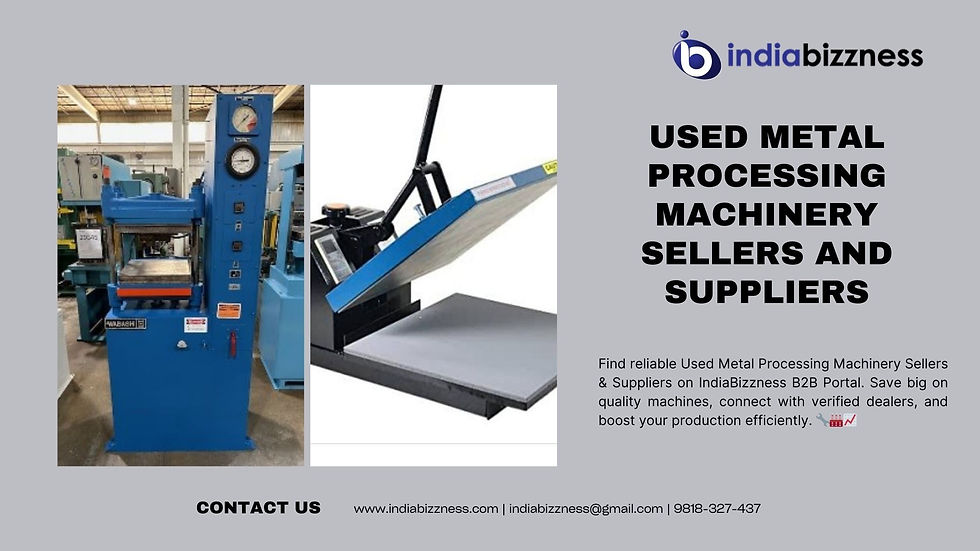Revolutionizing Print Industry: Second Hand Imported Offset Printing Machine for Sale in India
- indiabizzness99
- Mar 1, 2024
- 3 min read
In the dynamic world of printing, the demand for efficiency, quality, and cost-effectiveness continues to push boundaries. As India's printing industry flourishes, the need for cutting-edge technology becomes paramount. The Second-hand imported offset printing machinery offers a promising solution, revolutionizing the sector by providing access to high-quality equipment at affordable prices.
In this blog, we explore the significance of used imported offset printing machinery and its transformative impact on the print industry.

Understanding Offset Printing:
Offset printing remains the cornerstone of the printing industry, favored for its versatility, speed, and superior quality. This process involves transferring an inked image from a plate onto a rubber blanket, which then applies the image onto the printing surface. Offset printing excels in handling large volumes and producing consistent, high-resolution prints, making it indispensable for various applications, including packaging, publishing, and commercial printing.
Challenges in Acquiring Printing Machinery:
While offset printing offers numerous advantages, acquiring new printing machinery can be a daunting task, especially for emerging businesses and startups. The high initial investment, coupled with ongoing maintenance costs, often presents a significant barrier to entry. Additionally, limited access to advanced technology further complicates matters, hindering the industry's growth potential.
The Role of Second-Hand Imported Printing Machinery:
The used imported offset printing machinery emerges as a game-changer, addressing the challenges faced by print businesses in India. These machines, sourced from reputable manufacturers worldwide, offer a cost-effective alternative without compromising on quality or performance. By purchasing pre-owned equipment, businesses can significantly reduce their upfront investment while gaining access to state-of-the-art technology.
Advantages of Used Imported Printing Machinery:
Cost Efficiency: One of the primary advantages of investing in second-hand imported machinery is cost savings. Pre-owned equipment is typically available at a fraction of the cost of new machines, allowing businesses to allocate their capital more efficiently.
Access to Advanced Technology: Imported offset printing machinery often incorporates the latest technological advancements, enabling businesses to enhance their capabilities and compete on a global scale. From improved automation to advanced color management systems, these machines empower printers to deliver superior results.
Quality Assurance: Reputable suppliers thoroughly inspect and refurbish second-hand machinery to ensure optimal performance and reliability. Buyers can trust in the quality and durability of these machines, backed by warranty and technical support services.
Faster Implementation: Acquiring second-hand machinery eliminates the lead time associated with manufacturing new equipment, enabling businesses to ramp up production quickly and meet customer demands without delay.
Sustainability: By extending the lifespan of printing equipment through reuse and refurbishment, businesses contribute to environmental sustainability by reducing waste and carbon footprint associated with manufacturing new machinery.
Market Trends and Opportunities:
The demand for second-hand imported offset printing machinery in India is on the rise, driven by factors such as increasing digitization, expanding packaging industry, and growing awareness of cost-effective solutions. Market dynamics indicate a significant shift towards refurbished equipment as businesses seek to optimize their operational efficiency and stay competitive in a rapidly evolving landscape.
Key Considerations for Buyers:
When considering the purchase of second-hand imported offset printing machinery, it's essential for buyers to conduct thorough research and due diligence. Some key factors to consider include:
Supplier Reputation: Choose a reputable supplier with a track record of delivering high-quality refurbished machinery and reliable after-sales support.
Machine Specifications: Assess the specifications and capabilities of the equipment to ensure it meets your specific production requirements and workflow.
Inspection and Testing: Request detailed inspection reports and, if possible, conduct on-site testing to evaluate the machine's condition and performance firsthand.
Warranty and Support: Opt for suppliers that offer comprehensive warranty coverage and ongoing technical support to address any issues that may arise post-purchase.
Total Cost of Ownership: Consider not only the upfront cost of the machinery but also factors such as maintenance, consumables, and operational efficiency to determine the total cost of ownership over the equipment's lifespan.
Conclusion:
Second-hand imported offset printing machinery represents a paradigm shift in the print industry, offering a cost-effective and sustainable solution for businesses in India. By leveraging refurbished equipment, printers can access advanced technology, streamline operations, and enhance their competitive edge in the market. As the demand for high-quality printing continues to grow, embracing pre-owned machinery opens up new opportunities for innovation and growth, driving the evolution of India's printing industry into a vibrant and dynamic landscape.
Source:




Comments